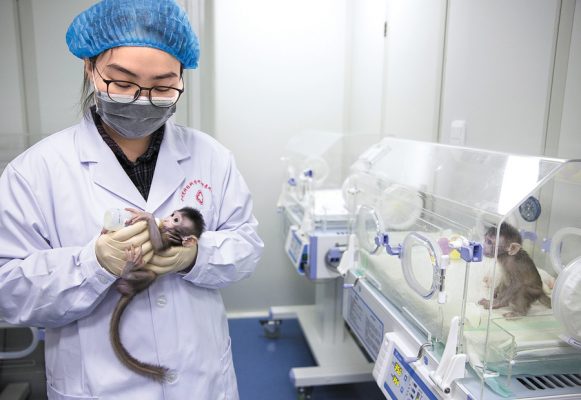
News of the successful cloning of two monkeys by Chinese scientists has made headlines around the world and triggered debate about moral and ethical standards, including in the United States.
A Gallup report on Thursday showed that about a third of Americans (32 percent) say they found cloning animals morally acceptable. The figure was based on the Values and Beliefs survey conducted by Gallup in May 2017.
When the same question was asked in 2001, only 31 percent said cloning animals was morally acceptable.
Meanwhile, 14 percent of Americans say they found human cloning morally acceptable in the same survey last May.
Unlike cloning animals, which has seen little change in moral acceptability over time, acceptance of cloning humans has doubled since the question was first asked in 2001, according to Gallup.
The acceptance has much to do with educational background. By a rate of 42 percent against 18 percent, Americans with at least some college education are more than twice as likely to say animal cloning was morally acceptable than those with a high school education or less.
However, the Gallup poll found that Americans’ views on the moral acceptability of human cloning vary little by education level. People with at least some college education are more likely to find human cloning morally acceptable than those with a high school education or less, but the margin was 16 percent against 11 percent.
“Americans have been growing more liberal in their attitude on many moral issues over time, but views on the moral acceptability of cloning animals have been steady across Gallup’s 17-year trend,” the Gallup report said.
“The percentage of Americans who say they find human cloning morally acceptable has increased, but the overwhelming majority still find it morally unacceptable,” the pollster said.
The cloning of the two monkeys, announced by Chinese scientists on Thursday, has used the same method that created Dolly the sheep in Scotland in 1996.
Zhong Zhong and Hua Hua, the primates, were created using the nuclear transfer of somatic cells, an organism’s non-reproductive cells, at the Chinese Academy of Sciences’ Institute of Neuroscience based in Shanghai.
Pu Muming, director of the neuroscience institute, said the reason to break this technical barrier is to produce animal models that are helpful for medical research and human health. “There is no intention to apply this method to humans,” he said.


